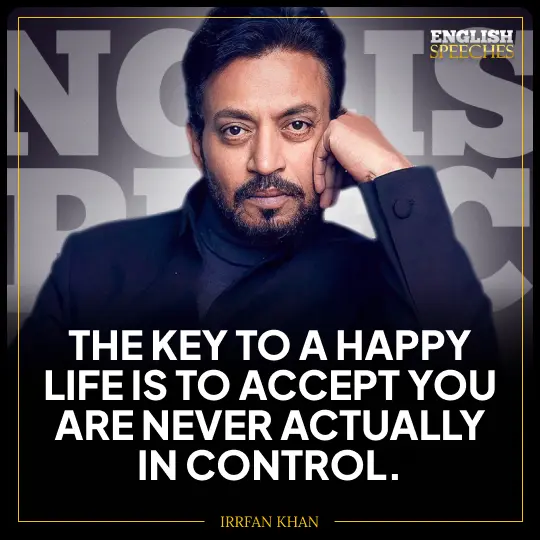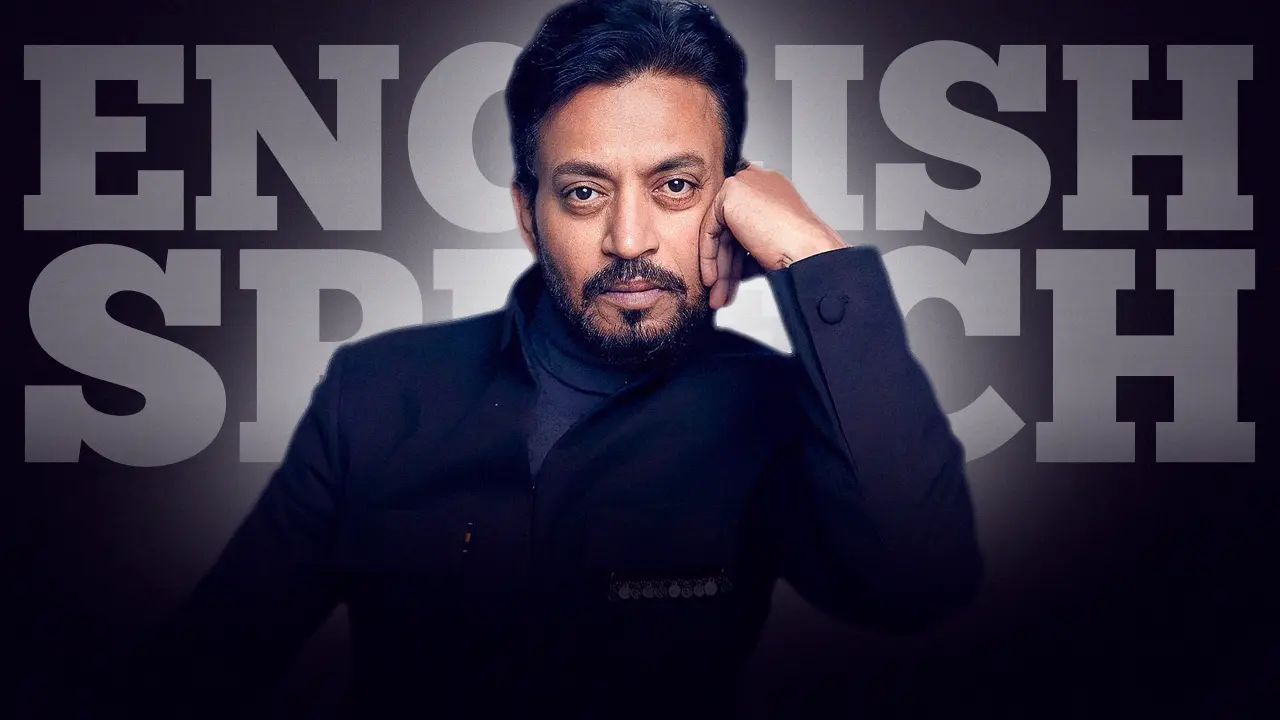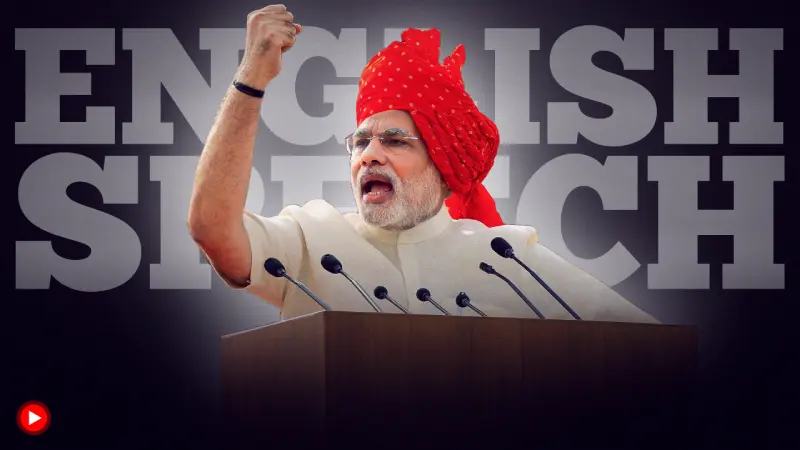Learn English with Irrfan Khan. Join us as we celebrate the legacy of Irrfan Khan in this heartfelt conversation with Lakshmi Pratury from 2015. The renowned actor delves into the enchanting world of storytelling, sharing how stories have the power to connect actors and audiences. Irrfan also recounts his love for street sports and a thrilling encounter with a tiger, offering a glimpse into his adventurous spirit. This video is a tribute to Irrfan Khan, whose incredible talent and inspiring journey left an indelible mark on the world of cinema before his unfortunate passing in 2020.
Donwload available for Premium Subscribers
PDF Full Transcript
Explore every word with our concise PDF transcripts.
Audio Version
Immerse in speeches with clear, downloadable audios.
English Lesson
Enhance English skills with interactive speech lessons.
⚬ Free 30-day trial

”The key to a happy life is to accept you are never actually in control.
Download available
for Plus Members
PDF Transcript
Access the full speech in an
easy-to-read PDF format.
Audio Version
Listen and download clear,
high-quality MP3 recordings.
English Lesson
Includes vocabulary
and grammar practice.
Offer ends in:
Offer ended.
Transcript
Lakshmi Pratury: Right now, you’re known mostly all around the world for playing the billionaire in the Jurassic World and for Life of Pi and for Lunchbox. But actually, you know, and of course, all the awards you’re getting all around the world, etcetera. But this is a 1988 Salaam Bombay film. One of the first films that you’ve done. You’ve been doing this but the recognition has come in maybe last ten years. So, has the… you know, but your work, your dedication, your interest is the same. So, in what way has people’s behavior toward you changed in the last five years?
Irrfan Khan: When I started, people used to consider me as a good actor but I could see that I am not ruling their heart. I am not creating a spell in their heart. They are not carrying memories. They know that he is a technically he is a good actor. They used to have a respect for me. But they never… I could feel that they never used to carry that experience of my stories or my characters home. That was the main difference when I started getting my kind of stories. When I had the confidence to put my own interpretation to the characters and then there was a kind of, you know, world I started creating and that started impacting people’s intellect and their emotion. That was the time I was waiting for.
Lakshmi Pratury: Yeah. This is the warrior in the film. So, you talked about your turning point. In what way was this film for yourself a turning point?
Irrfan Khan: I was doing television, a lot of television and most of the television was verbal drama. There was no behavior in it. It was mostly informative drama where you have to tell the audience what’s going in your head, what you are thinking, everything you have to verbalize.
Lakshmi Pratury: Well, literal.
Irrfan Khan: Literal. Like, you know, a housewife can be in the kitchen but still if she is hearing the television, she could follow what’s going on. She doesn’t need to look at it, you know.
Lakshmi Pratury: Okay. That’s interesting. Okay, okay.
Irrfan Khan: So that was a kind of limitation and I used to struggle with it. You know, whenever I used to go for the shoot of these series, sometimes the producer used to get bugged. They just wanted me to, you know, blurt out lines, you know, as fast as I could so that, you know, they can save money in the editing, they can save money otherwise as well, you know. They didn’t want any kind of behavior. Even if sometimes I used to think that, you know, this guy shouldn’t look like this, he should look somewhere, you know, somebody else, they used to dissuade me, you know, because everything costs money. So, I was getting frustrated and at that time, this story came to me and at that time I felt how things sometimes follow you and they give you what you are looking for. I was looking for a story where I could behave in that story, where I don’t need to rely on lines to communicate. And this story came to me and I was reluctant to go because the casting director told me there is a guy from London and he is looking for an actor who can play warrior.
Now I know my physicality and I said, “No, I am not going there because, you know, he must be looking for a bodybuilder kind of person and, you know, I don’t fit in.” He said, “No, no, no, please go and meet him.” And the time I entered the room, I had some feeling. I met this director Asif Kapadia and then we started talking and then we kept on talking and I had a feeling that there is something waiting for me here. And then the process started. And at that time, I was also indulging myself in production. So whatever money I earned, I have already invested in some pilots and they were supposed to be approved. So I did the shooting of this film for two, two-and-a-half months and then there was a kind of a spell of this story. This is the first time I experienced what a story can do to an actor, how it grows on you when you are continuously shooting a story or when you are, you know, continuously dealing with that character, how that character, that story create a spell on you and it becomes a part of your experience.
It becomes real for you. And at the end of the shoot, my wife came to the shoot and she was worried about the money which we have already invested in television and she was saying, “What do we do about that?” And suddenly something said from inside me, she said, “I said just forget it. Life is showing me some path. Let me follow it. I don’t care how much money I put there. I know, I have seen production. I am not made to deal with that kind of life. I cannot become a producer where I have to think each and, you know, I have to think about money, how to save money.”
Lakshmi Pratury: Where you have to tell your actors to talk fast so you can save money.
Irrfan Khan: Exactly. So that, you know, that this film showed me a path and I just followed it and, you know, my life changed after that.
Lakshmi Pratury: Yeah. So is… do you find there is a difference between… maybe it’s too… being too general or is that… the movies in the West versus movies that are made here is when you go… work with Ang Lee to make Life of Pi or… is there a certain way of developing a character that’s very different than when you work here or is it just with a director like, you know, there is… obviously there is one more thing of Magbool, you know, which is also another film. In the Indian cinema, that’s one of the things that was really very powerful character that you played or a powerful story. So is it that the particular director you get or in the East versus West, are there different ways that we make films that… that make you an actor in a different way?
Irrfan Khan: See, there are few differences and they are very, you know, very important differences. Like sometimes in our industry, we are… the center of the story is the image of the star and all the departments serve that image. All the characters around him serve that image. The films which I do in Hollywood, there the center is the story, the power of the story. You can take anybody, you know, from Tom Hanks to everybody, all the big stars, they are serving the purpose of the story, not the image of the star. So that changes everything because all the departments are working towards communicating that idea, that story and people bringing their own reflection, their own experience of their life to enhance that story, not about serving a particular image, you know, star’s image.
If you are not doing a conventional work, if you are not following conventional, you know, storytelling, you are made feel guilty about what you are bringing a newness to the craft. You are in pressure. You know, you are always like a threat. What is this guy doing? Why we are not being able to, you know, either you should come and serve our conventional storytelling or you are an outsider, you are creating a kind of disturbance.
Lakshmi Pratury: I don’t know if it’s true or not, not just in acting, in about everything I feel a lot of times here that you have to go somewhere outside and get the respect and then you will get to do what you want to do here. Is that your experience?
Irrfan Khan: No, I think it’s the audience which really felt nice about a person from their country getting recognition there, but not the industry. Industry only react to the business. If you do a business, if your film do business in the local market, only then you are recognized. So they only react to business. That’s the… sometimes, you know, it’s a limitation for anybody, you know. It’s not an encouragement.
Lakshmi Pratury: So now we see, we know you, most of the people know you only through the characters that you play, which are very… most often very deep, very serious. So is there a lighter side to Irrfan Khan? I mean, is there a goofy side to Irrfan Khan or are you your characters?
Irrfan Khan: I keep doing it, you know, time to time like Piku I did or… but I am… I am more drawn towards lighter side of life, you know. I’m… it’s just that, you know, I didn’t have choice, that’s why I kept on doing all these films. But I don’t enjoy intense.
Lakshmi Pratury: But as a person, what are you? What’s your idea of having fun?
Irrfan Khan: I am drawn to humor, I am drawn to lightness, you know, not the… not the usual intense stuff, you know. It bores me completely, you know. I run away.
Lakshmi Pratury: So, if you weren’t doing films, if you want to hang out with a bunch of friends and not discuss like, you know, some storyline or something of that sort, what are the sort of things you like to do?
Irrfan Khan: Anything, you know. I like sports, physical sports. I love to play physical sports wherever. Sometimes you know, we used to play… I used to have cricket bat and kites in my, you know, back of the car. Whenever I used to get chance, you know, we used to just go down and play. Earlier I used to, you know, I used to stop my car at the street and I used to play with, you know, on Sundays in town, people play cricket on roads. So I love physical sports. I love adventure in forest. Forest is something, you know, which just… it creates a spell on me. It’s like, you know, I forget the language when I go to forest and it just put me into a deep silence and it’s a kind of high which I get.
I think it’s my childhood because my father used to take me to forest in my childhood and I’m deeply connected to forest. But not the way conventionally people go to forest where you are sitting in a vehicle and you are looking at the animals as an outsider, “Oh, he’s there, oh, they are there.” I don’t enjoy that. I only enjoy when I go in the forest the way the animals are, you should be exactly in the same level where you know, you shouldn’t be in a vehicle, you should, you know, just walk around and see. And that gives you an adventure, you know, that when you encounter an animal and you are equal, that is kind of experience which is… which can’t be matched, you know. And by chance if you see the tiger at that time…
Lakshmi Pratury: That was going to be my question that what do you do?
Irrfan Khan: I swear, that is an experience.
Lakshmi Pratury: Has it happened to you?
Irrfan Khan: Yes, yes. You will feel that you know, your knees are, you know, they are made up of water and that is an experience.
Lakshmi Pratury: Yeah.
Irrfan Khan: And…
Lakshmi Pratury: But has it happened to you when you went to the forest?
Irrfan Khan: Yeah, yeah, many a times.
Lakshmi Pratury: So tell me about it, what happened?
Irrfan Khan: There are some buffer jungles, you know, buffer forest of Jim Corbett. I don’t want to tell the exact location because of, you know, so many things. And they are still pristine forest, you know, they are still untouched. All the poachers, you know, they find out things about… but it’s still, you know, they are forest like you see a tree which has fallen down 20 years back, they’re still there, it’s getting decayed. And you see that there’s not many people come there. In those kind of forests when you go and you know that, you know, after five meter, you don’t know what is there. It’s so dense. So when you go there and when you’re walking around, you know, on the riverbank and you don’t know what is there, suddenly, you know, we were there and a guy from… local guy was with us and he just has one stick, that’s it.
And there was a mound and after that there was a deep inside. And as we, you know, climbed on that mound, like you know, ten meters away, there was this tiger and suddenly growled. It growled but because… you know what happens when the tiger is there, he first, you know, he warns you, then growls. Then when you are too close, then he attacks with fright. You know, he doesn’t attack because of, you know, some… because you know, he is basically trying to save himself. So unfortunately, you know, the distance was too close. So he suddenly growled and he started growling. And then this guy panicked. The guy who was with us, the local guy, he panicked. He expert, he panicked and he started growling at him. And he growled in a, you know, he has shouted desperately because he knew if, you know, this is something, you know, we have gone, we have gone, you know, we have crossed the limit.
Lakshmi Pratury: Too close for comfort.
Irrfan Khan: Too close. Because we didn’t know. And then suddenly, you know, he backed up and he, you know, he went away.
Lakshmi Pratury: So is that the answer? You have to start growling if you see…
Irrfan Khan: I think you have to, you shouldn’t go… Yeah, you shouldn’t take away your eyes and, you know, you have to face it.
Lakshmi Pratury: Yeah. So did we make all of you start growling or it just…
Irrfan Khan: No, we didn’t. No, no. He is the expert, you know, he just growled and we were, you know…
Lakshmi Pratury: Just watching.
Irrfan Khan: Just watching… And after, you know, even for six, seven hours, it was a kind of, you know, strange, you know, blood pressure which is going on and, you know…
Lakshmi Pratury: So did you go back again into such a forest or?
Irrfan Khan: Oh yes. And also because it’s a most beautiful and most shy animal. It’s such a beautiful animal. You have to see it in its… and it doesn’t disturb. You know, when a human being starts disturbing the forest, he goes away. He lives in a forest which is pure and pristine. When you start doing, you know, manipulation in the forest, he leaves that forest. He is such a shy and beautiful animal.
Lakshmi Pratury: Yeah. So Irfan, what’s next for you? You’ve been… what’s your next movie or are you going to buy a sports team or… what’s next for you?
Irrfan Khan: I want to play first, you know, I don’t know how to own a sports team. I would love to play. We can play here right now, you know.
Lakshmi Pratury: What would you like to play, soccer or what?
Irrfan Khan: Yeah, socc… yeah, we call football here. Yeah. From football to kabaddi to cocoa to, you know, cricket, anything, badminton to anything, which shakes your body.
Lakshmi Pratury: Right. Maybe we should auction a game with Irfan to raise some money for the next charity.
Irrfan Khan: Yeah, I was… I was saying, you know, let’s make a league of a… of a… what do you call here, Lagoori.
Lakshmi Pratury: Yeah, okay.
Irrfan Khan: I think they haven’t really thought about it. It could be a very entertaining television game.
Lakshmi Pratury: Yeah, I think we should produce that now, you know.
Irrfan Khan: Let’s see.
Lakshmi Pratury: So do you have as parting word, what are you doing, what is the next movie, what is the next journey, which country are you going off to?
Irrfan Khan: I have just finished a film called Inferno, which is a third series in that Da Vinci Code series.
Lakshmi Pratury: Right.
Irrfan Khan: Written by Dan Brown.
Lakshmi Pratury: Yeah.
Irrfan Khan: And I happened to work with a fantastic team. I had a great experience doing that. And…
Lakshmi Pratury: One of the few actors turned directors who’s been really…
Irrfan Khan: Yeah, yeah. I, you know, I spoke to him about this, you know, and he said, “I was not as creative as an actor.”
Lakshmi Pratury: Yeah.
Irrfan Khan: That’s why, you know, I stopped doing acting because I could see that I’m not adding creatively to the craft. And, you know, the kind of story he has told, it’s excellent, you know, outstanding. And the kind of human being he is, you know, it’s a pleasure to be with these kind of people.
Lakshmi Pratury: Yeah. So, and after that, are you taking rest for a bit or are you off to the next film?
Irrfan Khan: No, I’m still… See, the thing is, at one point of time, I started my career as an actor because I was looking for acknowledgement. First, I was looking for acknowledgement from my mother. When I didn’t get it, I started looking, you know, outside of my, you know, surroundings. And that somehow manifested into, you know, becoming an actor that, you know, I thought actor, you know, basically it was for acknowledgement. And then through, you know, after drama school and, you know, after many years, I came to know this is not acknowledgement.
It is… It is a experience, you know, which you share with the audience and that becomes your, you know, wealth. That is the most important thing. When you do a story, you pour in your life and you make that thing, that story an experience for the audience and that becomes an experience for the audience and that sharing is something which is… which is so precious, you know, you cannot match that kind of thing. So, that is something, you know, very… very special to me as an actor. And sometimes I don’t plan, you know, I rely on how nature, you know, nudges you and you follow that and, you know, see what’s going to happen.
Lakshmi Pratury: Great. Thank you so much for your time, Irfan.
Irrfan Khan: Thank you. Thank you very much.






